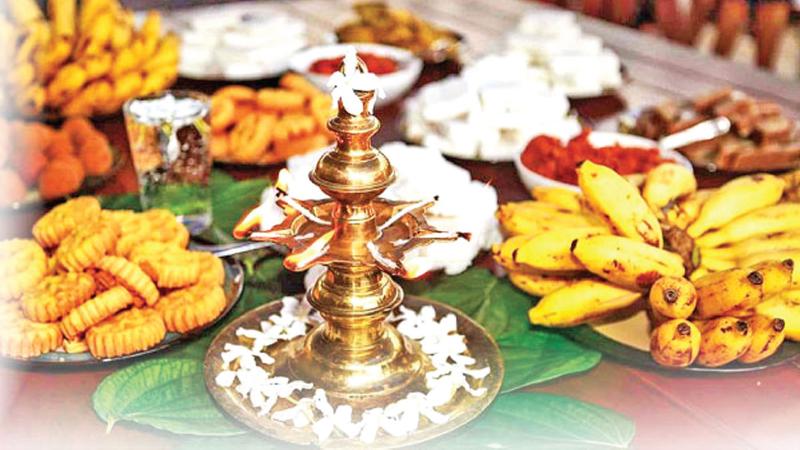
Diseases like diabetes, hypertension, cardiac disease and stroke are leading causes of mortality and morbidity overtaking communicable diseases. The best way to prevent these debilitating diseases is to limit the quantity you consume during the festive season, says the Director, Non Communicable Diseases Unit, Ministry of Health and Indigenous Medicine, Dr Thilak Siriwardana. He offered the following guidelines to our readers on how they could keep healthy by eating right this festive season.
 Excerpts from his interview
Excerpts from his interview
Q. The National New Year has dawned and festive tables around the country are loaded with all kinds of rich festive sweetmeats. Thus the tendency to overeat during this time around is inevitable. What kind of foods should we avoid or eat in small amounts in order to minimise adverse impacts on our bodies?
A. The Sinhala and Hindu New year is based on auspicious times in which cooking and eating are closely interwoven. Food thus plays an important role in this festival which is also followed by the harvesting of paddy. To ask people not to eat the delicacies prepared for them with so much loving care during this season is thus unfair. However, due to the present sedentary lifestyle that most of us follow, and the high prevalence of NCDs, we should think of WHAT we eat during this season. Eating large amounts of sweet and oily foods would pose a threat to one’s health and life. Ingesting a high number of calories into the body is equally damaging to one’s health.
Q. Spell out the kind of effects that could impact our health as a result of indulging in these rich festive foods?
A. Any food you eat contains calories, sugar, salt and fat which are ingredients we should keep our eyes on, particularly, at this time. High calories in any form, especially, carbohydrates (including sugar) and fat would lead to overweight and obesity. They would further lead to high levels of blood pressure, blood sugar and cholesterol. Eating food rich in salt would lead to high blood pressure and affect most of the organs in the body.
Q. Are these impacts confined to a specific group or everyone?
A. The impact of eating unhealthy food in large amounts will affect almost everyone irrespective of gender or age, but at various levels depending on the age, sex, other diseases and metabolic risk factors (overweight, obesity, high blood sugar, cholesterol and blood pressure) of the individual.
Q. Who are those most at risk?
A. Those with metabolic risk factors are more at risk for impacts from ingesting unhealthy food.
Q. Are elderly persons more vulnerable to over consumption of festive food? If so why?
A. Elderly people mostly spend less calories as they have passed the development or growing stage. The growth spurts you see in young persons is behind them. But they need food to protect, repair and maintain their body and health. The risk is that if they consume more than what they really need it would lead to all metabolic risk factors for NCDs.
Q. If their systems are already compromised, will giving up their controlled diets even for a few days of the festive season harm them?
A. If their systems are already compromised why should we deviate from their routine? However, just tasting Avurudhu food in small amounts will not impact too much on their health. But it is important that they should consult their doctor before consuming them.
 Q. What about children? What special risks do they face at this time of the year by indulging in sweet based food and drinks?
Q. What about children? What special risks do they face at this time of the year by indulging in sweet based food and drinks?
A. If a child is already overweight and obese, the parents should think twice before allowing them to consume unlimited amounts of sweet based food and drinks, especially, during the festive season. If their eating is uncontrolled during this period they are likely to gain more weight at the cost of their health leading to early NCD development.
Q. What about tooth decay?
A. Dental surgeons advise cleaning your teeth as often as you can when you eat and drink sweetened foods and beverages, including, fruit juice. If children don’t clean their teeth after meals it could lead to tooth decay. I suggest that all parents of young children take their kids to a dental surgeon after the festive season to check the status of their oral health,
Q. Obesity is now an emerging problem among children affecting them when they reach adulthood. How does being obese or overweight endanger their health in the short term and long term?
A. Obesity and overweight are known metabolic risk factors of NCDs. Therefore, obese and overweight people are known to be more vulnerable to develop hypertension, diabetes, dyslipidemia than with a normal body weight.
They could also suffer from subfertility than persons with normal weight. Obesity prevents children from being as physically active with a normal body weight. Physical inactivity in childhood would definitely continue into adulthood and put them at risk of NCDs.
Q. Golden rules to follow?
A. Enjoy the New Year but stick to a controlled diet. Avoid excessive consumption of sweet oily food with too many carbs. Clean your teeth after every meal to avoid cavities caused by an over load of sweets. Take your prescribed drugs if your immune system has already been compromised with NCDs .Exercise and be physically active to get rid of excessive calories.
